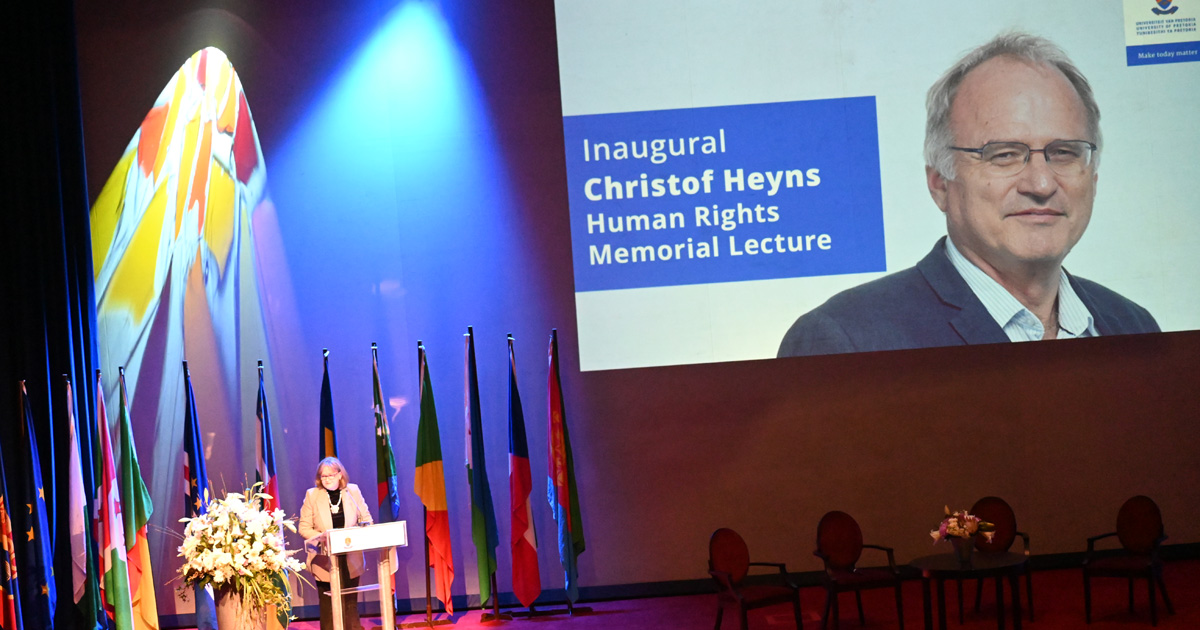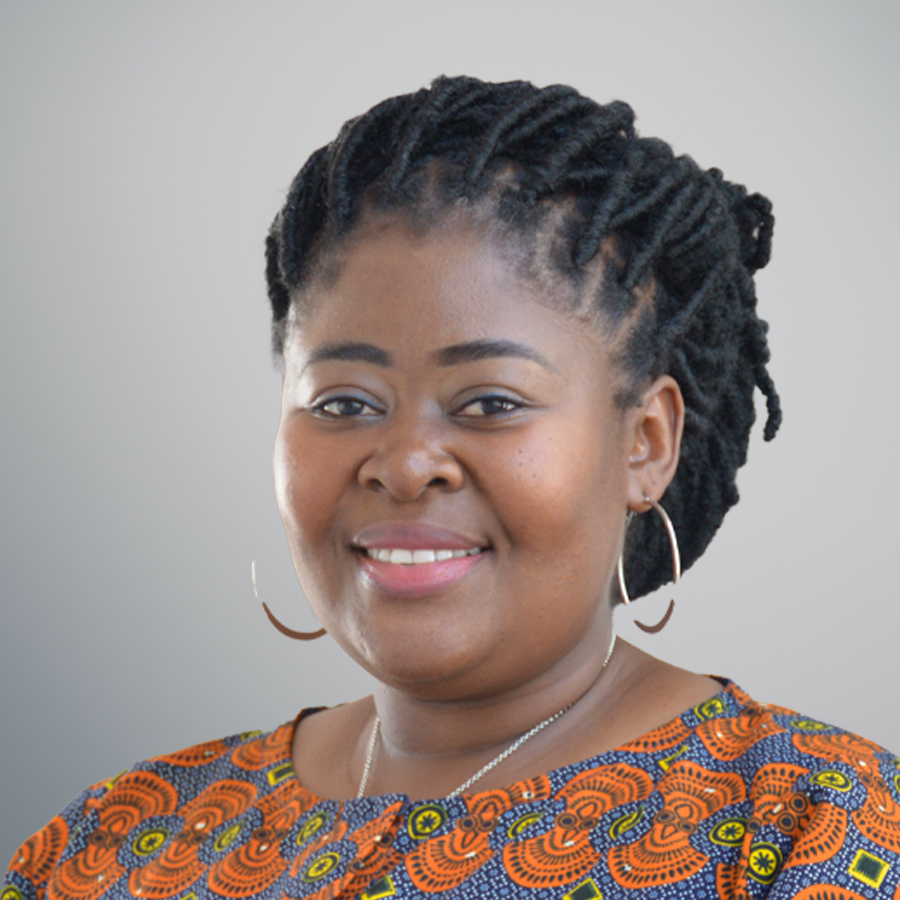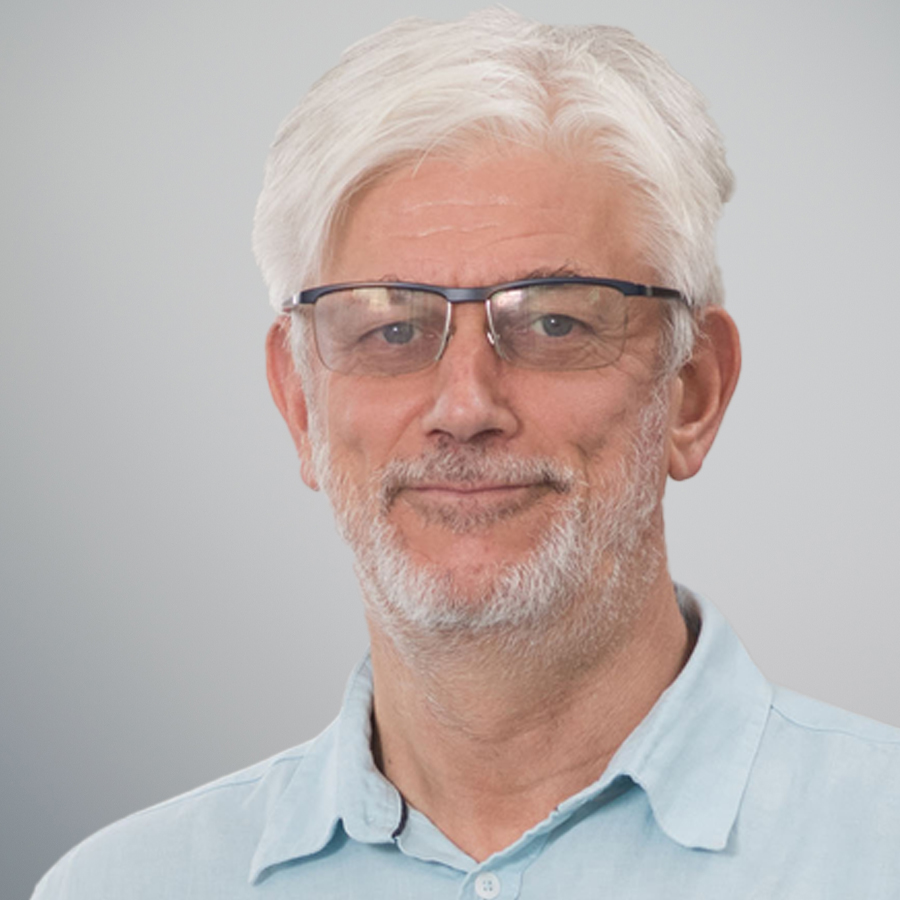On Friday 28 July 2023, the Centre for Human Rights, Faculty of Law, at the University of Pretoria (Centre), held its inaugural Christof Heyns Human Rights Memorial Lecture, at the Aula, University of Pretoria. The event was attended by about 150 participants in person, including Christof’s wife Fearika, and two daughters, Willemien and Renée, and around 50 participants online. The three panellists presenting the Lecture emphasised that the history and future of human rights remain based on struggle, and that the strategy against the current push back against human rights should be grounded in greater solidarity and more nuanced and sophisticated articulation of human rights language.
Professor Christof Heyns, who passed away suddenly and too early on 28 March 2021, was an internationally renowned human rights lawyer, legal educator and activist. He was one of the founders of the Centre, and its Director from 1999 to 2006. He also was the Dean of the Faculty of Law, and served within the United Nations as Special Rapporteur on extrajudicial killing and as a member of the Human Rights Committee.
Professor Caroline Nicholson, Registrar of the University of Pretoria, made welcoming remarks, and the Dean of the Law Faculty, Prof Elsabe Schoeman inaugurated the Christof Heyns Lecture. She pointed to a number of other initiatives that the Faculty and Centre had taken to honour Christof’s memory, including the publication of a volume of essays, A life interrupted: Essays in honour of the lives and legacies of Christof Heyns. This was followed by some reflections on Christof’s life, first from his wife, Fearika Heyns, then professional reflections by Lloyd Kuveya, Assistant Director of the Centre, and some collegial reflections from Justice Johann van der Westhuizen, former Judge of the Constitutional Court, and former Director of the Centre. Justice van der Westhuizen focused on Christof’s influential role in the inclusion of a provision (section 184(3)) in the South African Constitution, 1996, which requires that ‘organs of state’ have to report annually to the South African Human Rights Commission (SAHRC) about the measures taken to realise socio-economic rights. However, Justice van der Westhuizen also lamented the lack of regularity in adherence to this constitutional obligation, and warned that any failure to observe constitutional imperatives erode the Constitution.
A short video was screened starting with a poem read by Christof’s daughter Willemien, followed by reflections by his son Adam and a few colleagues who worked closely with Christof, including Prof Charles Fombad, with whom he established the Stellenbosch Annual Seminars on Constitutionalism in Africa, Dr Thomas Probert, who served as a research consultant to and worked closely with Christof’s rapporteurship, and Carole Viljoen, with whom he worked at the Centre for numerous years.
In keeping with Christof’s sense of inclusion and collaboration, a three-part panel collectively delivered the ‘Lecture’, exploring the theme: ‘Human Rights at a cross-roads’. The panel discussion was moderated by the Centre Director, Prof Frans Viljoen, and comprised of three highly regarded panelists, who each has a special link to Christof. Chief Justice Mumba Malila, Supreme Court of Zambia, was the last doctoral student that Christof saw graduate under his supervision. The Honourable Yvonne Dausab, Minister of Justice, Namibia, in 2001 was a student in the Centre’s Master’s programme in Human Rights and Democratisation in Africa (HRDA), which is Christof’s brain-child. Justice Albie Sachs, former Judge of the South African Constitutional Court, had always supported Christof’s initiatives. Christof invited him to be the guest speaker at the first African Human Rights Moot Court Competition, held in Harare in 1992; and at the first Nelson Mandela Human Rights Lecture, presented in Geneva in 2019.
The panel addressed the following broad questions: In the year in which the Universal Declaration of Human Rights turns 75, the global human rights project is increasingly being challenged, and may be seen as being at a cross-roads’ Are we at such a point? How did we get here? Where do we go from here?
In the first part, the panel was asked to identify the ills in relation to the demise of human rights on the African continent. Chief Justice Malila focused on the issues around increasing restrictions on individual liberties, such as the restrictions on the expression of sexual orientation. He critically examined various arguments used by African governments to challenge expression of sexual orientation, such as perceptions of sexual orientation as ‘sexual corruption from the West and immorality at its worst’. He noted the importance of respect for the individual freedoms of others, even if that is not one’s own personal belief, and the importance of respect for the rights to freedom of association, due process, dignity and privacy. He gave examples of increasing push back in various African countries, including Uganda and Ghana, while noting that other countries on the continent are taking a different, more progressive stance, such as Botswana, where the Court of Appeal decided that ‘sodomy laws’ violate the Constitution of Botswana.
Minister Dausab shared a eulogy of Christof. In her presentation she spoke about the protection of human rights defenders, noting how matters of conflict and security have taken new directions, including sexual violence, looting of resources and gender equality. She noted that ‘the struggle is real for all of us’, and questioned ‘has democracy failed women’. She highlighted that there is a growing discontentment with sexual orientation and gender identity issues by African governments, yet there is a need for inclusion and service delivery for persons living with disabilities. She argued that ‘one cannot be selective as to when courts ought to uphold human rights and when not to’. She referred to the book by Justice Albie Sachs titled The soft vengeance of a freedom fighter.
Justice Albie Sachs started by controversially asking how he has become ‘conservative’. He explained that he has become a ‘conservative’ because he is now intent on ‘conserving’ the gains and achievements of human rights. He is a conservative because he is devoted to being anti-patriarchy, anti-war and anti-oppression. The quintessential story-teller, he told stories of his life during the struggle against apartheid and the need for inclusion in solution building. Justice Sachs noted that although ‘the word patriarchy was not used when I was young, the pushback is against the right to be different’.
A further question was posed by the moderator: what then can be the way forward?
Justice Malila stated the importance of demystifying cultural beliefs of the African people. Referring to the SERAC decision by the African Commission on Human and Peoples’ Rights in respect of Nigeria, he noted his discomfort with one specific statement in the SERAC judgment that ‘international law and human rights must be responses to African circumstances’. Instead, he argued, Africans should tailor their responses to international law and human rights.
Minister Dausab shared the view that there must be some general acceptance of what constitutes ‘values’, and specifically generally accepted ‘African values’. Referring to renowned African writer, Chinua Achebe, she noted that, in relation to human rights in Africa, and the protection of vulnerable groups, that ‘we are no longer at ease’. She also reflected on the work of Angela Davis, noting that in relation to women, culture and policy, our struggles are intertwined.
Justice Albie Sachs noted that there is currently much push back against human rights and individual freedoms, and asked ‘how do we pushback against the pushback?’ He asserted the importance of finding techniques to fight back against the push back, giving an analogy of a tunnel: When one is in a tunnel, it makes sense to have tunnel vision, that is a restricted way of thinking, a narrow perspective, as one loses touch with the people, because that is all that is available to you. But when one is out of the tunnel, one can no longer have the same restricted tunnel vision. He expressed a further concern that it seems today that humanity can give up everything to those who have money, including outer space, and a healthy environment. He warned that this should not be the case.
Comments and questions were raised on how to find a balance between African culture and the realisation of human rights, including rights pertaining to sexual and gender orientation, whether awareness can be the solution for the realisation of human rights more broadly, and if so, whose responsibility it is to raise such awareness, and whether matters such as state capture and destablisation can be seen as crimes against humanity. In response, the main ideas were expressed that ubuntu contradicts the egotistical individualistic tendencies in favour of human rights, and that human rights are best understood as universal. As stated by Judge Albie Sachs, and echoed by all panellists, ‘pain is pain’, ‘everyone feels pain’, and ‘the struggle is real’. This brings to mind the argument that if one person currently enjoys human rights, but refuses to protect the human rights of others, it is only a matter of time until the rights that matter to the first person are curtailed by those in power, hence an argument is made ‘rights for all, or rights for none’.
There were also emotional reflections on Christof’s life and contribution to individuals in the audience, and recommendations that while the Centre has been casting its net wide across Africa, maybe it is now time to allow the waters to start flowing into the Centre from Africa, through the alumni and partners across the region and the people whose lives have been enriched by Christof’s life.
Prof Frans Viljoen expressed the hope that ‘the first Christof Heyns Human Rights Memorial Lecture would be one of many to come, and that it would be institutionalised as an annual event, to provide an opportunity to reflect on, influence and provide education on pertinent human rights issues across the African continent’.
The event was supported by the European Union through the Global Campus for Human Rights, which supports the HRDA programme, presented by the Centre together with 12 partner universities from across Africa. The Centre is one of seven (soon to be eight) regional hubs of the Global Campus of Human Rights, which each presents a master’s programme in partnership with universities in different regions of the world.
For more information please contact:
Tel: +27 (0) 12 420 6703
michelle.maziwisa@up.ac.za
Centre for Human Rights
Tel: +27 (0) 12 420 3228
frans.viljoen@up.ac.za








